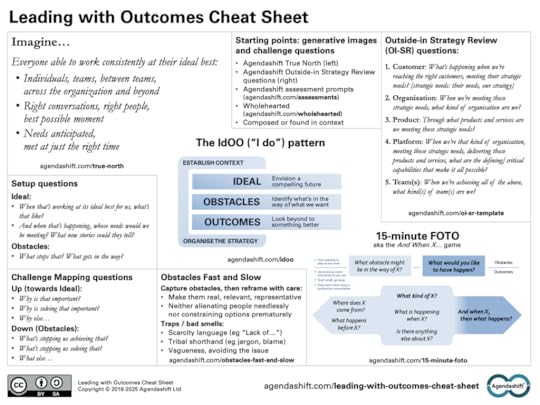Leading with Outcomes Cheat Sheet v2.1
Over the past couple of weeks I’ve done a couple of iterations on the Leading with Outcomes cheat sheet. In addition to several cosmetic improvements, the latest includes a version of the graphic we use in our training for the IdOO (“I do”) pattern: Ideal, Obstacles Outcomes:

Grab yours here (it’s free!):
This resource concentrates on what OD folks might describe as the inquiry aspect [1] of Leading with Outcomes. I hope in due course to produce similar cheat sheets for its context-capturing aspects and its generative/ideation conversations, but for now, let’s see how this existing cheat sheet relates to the Leading with Outcomes curriculum.
Starting (as one should) with Leading with Outcomes: Foundation, the IdOO pattern shown in the cheat sheet’s centre is this module’s most important topic, dominating three out of four sessions and making its presence felt in the last one too. In exercise form, the pattern is most often used with the setup questions shown middle left; as a leadership routine, it allows plenty of room for personalisation. Foundation uses a somewhat simplified version of Obstacles Fast and Slow (bottom middle, formerly Good Obstacle, Bad Obstacle) and a much-simplified version of 15-minute FOTO (bottom right).
As workshop activities and coaching patterns, and with leadership takeaways, those simplified exercises are covered in more depth in the Inside-out Strategy module, whose structure is given by the now-familiar IdOO pattern. This module also covers the Challenge Mapping questions (bottom left), of which “Why is that important?” appears on its own in Foundation. We like to sneak it into the otherwise Clean Language-based coaching game 15-minute FOTO also – see [2] for a writeup.
Combined with the IdOO pattern, the Outside-in Strategy Review questions (top right) feature heavily in the Outside-in Strategy module. There is plenty in them to unpack!
Notice the section top centre of the cheat sheet, Starting points: generative images and challenge questions. That’s starting points plural, so where do you start? Now we are in workshop/intervention design territory, and that is covered in the fourth and final session of Train-the-Trainer / Facilitator (TTT/F). The next one takes place in a month’s time:
16-19 June, four 4-hour sessions online, afternoons UK time:Leading with Outcomes: Train-the-Trainer / Facilitator (TTT/F)
Still unaccounted for module-wise is the Adaptive Organisation. Rather than focusing on the abovementioned patterns, routines, and exercises, this more advanced module assumes at least some passing exposure to them. Accordingly, in various packages of public and private training held both in person and online, the Adaptive Organisation and Foundation modules are often combined. With the spring cohort of LIKE already underway, your next scheduled opportunity comes in the autumn:
30 September to 11 November, online, cohort-based – 7 weekly sessions, 2 hours each:Leading in the Knowledge Economy (LIKE) – Autumn 2025 cohort
If that seems too far away, there is the recent book Wholehearted for you to read and further whet your appetite, and also the self-paced training option, which you could begin today! For the latter, Foundation is the place to start, and a cheaper Foundation-only subscription is now available. You can upgrade this to cover the whole Leading with Outcomes in your own time. So what’s stopping you?
Further reading[1] See my 2024 book Organizing Conversations for a distinction between inquiry and generative conversations that I didn’t make in the 2021 Agendashift 2nd edition. Both come under the umbrella of dialogic organisation development (dialogic OD).
[2] 15-minute FOTO’s cheat mode (October 2023)



